Tattoos have been a part of human cultures for thousands of years. They serve as an expression of one’s personality, beliefs, and identity. Among the various tattoo designs available today, the Japanese tattoo design stands out with its unique symbolism and intricate artwork. The Japanese have a long-standing history of tattooing, and their traditional designs are deeply rooted in the country’s culture and mythology. In this article with Impeccable Nest, we will take a closer look at the tattoo meaning Japanese and what makes this particular style so captivating.
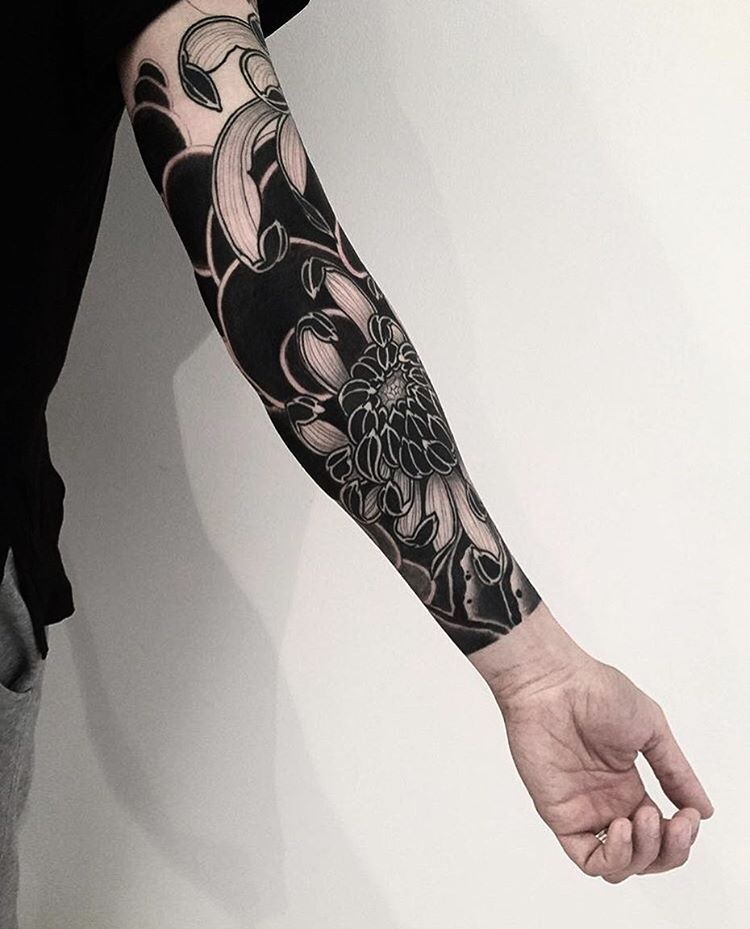
The Origins of Japanese Tattoo Design
The art of tattooing in Japan dates back to the Jomon period (approximately 10,000 BCE to 300 BCE). People would use needles made from fish bones to puncture patterns into their skin, which they believed had magical powers. Over time, tattoos became more elaborate and began to depict animals, flowers, and mythical creatures. By the Edo period (1603-1868), tattoos had become associated with criminality and were used to mark prisoners. However, during this period, tattoos also gained popularity among the working-class people who used them to express their identities and beliefs.
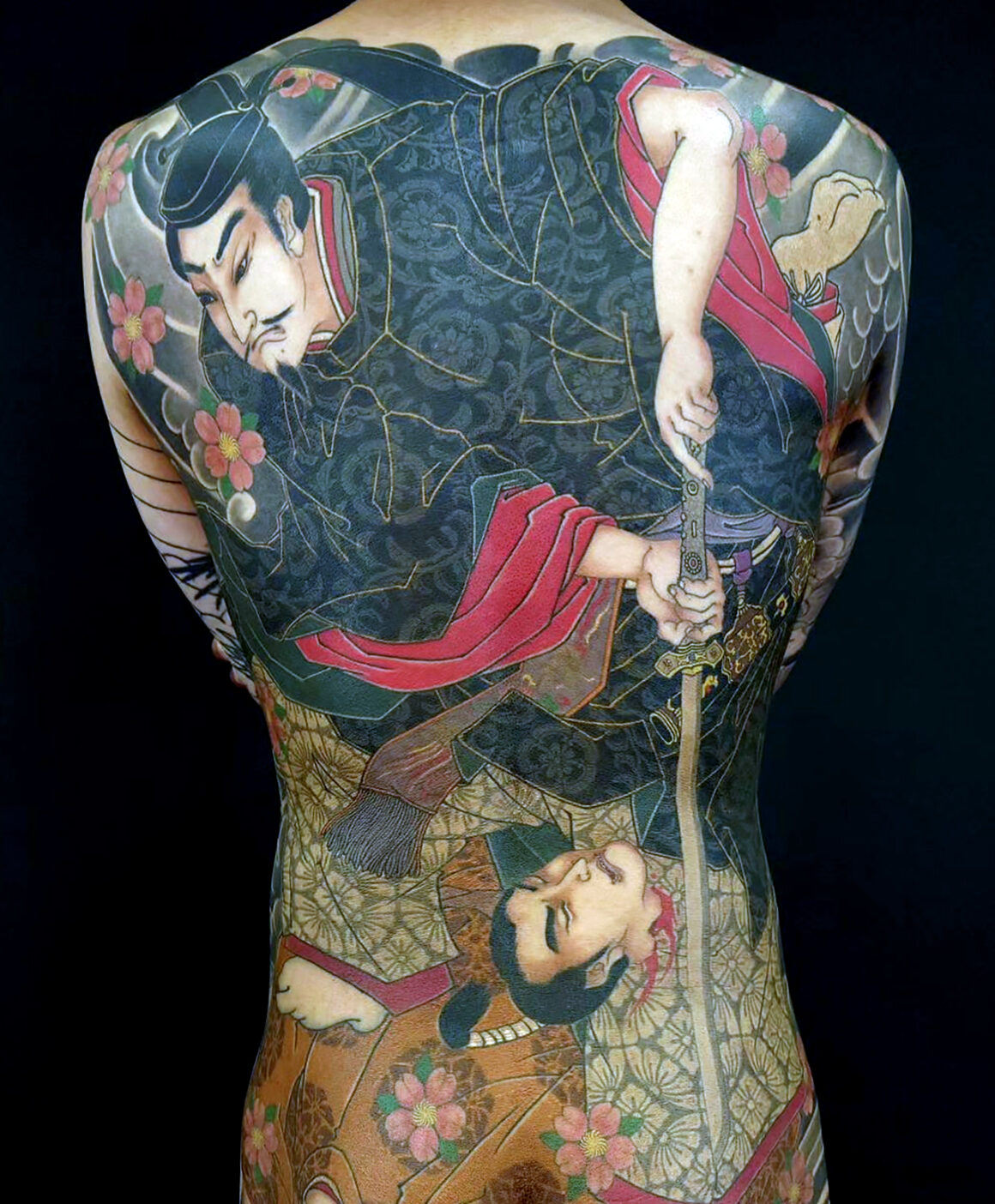
The Symbols and Meanings of Japanese Tattoo Design
Japanese tattoo designs are known for their intricate details, vibrant colors, and meaningful symbols. Every element of a Japanese tattoo has a specific meaning, and the overall design often tells a story. Here are some common symbols and meanings found in Japanese tattoos:
Koi Fish
Japanese tattoo art has a rich history, and one of the most popular themes in this style is the Koi fish tattoo. Koi fish are often depicted in Japanese tattoos due to their significant symbolic meaning. Koi fish can represent different things, depending on the color and direction they swim. However, in general, they are believed to symbolize strength, determination, and perseverance.
Koi fish have been a part of Japanese art and culture for centuries. In Japanese mythology, koi fish are said to swim upstream to reach the top of a waterfall where they transform into a dragon. This transformation from a humble fish into a powerful dragon is believed to represent personal growth and transformation. Therefore, Koi fish tattoos are often associated with personal development, spiritual growth, and change.
The symbolism of the koi fish can vary depending on its color. For instance, a red Koi fish is believed to symbolize love, passion, and strong emotion. A black Koi fish represents masculinity and overcoming adversity, while a blue Koi fish stands for calmness and serenity. A yellow Koi fish is associated with wealth, success, and abundance, while a white Koi fish symbolizes purity and innocence.
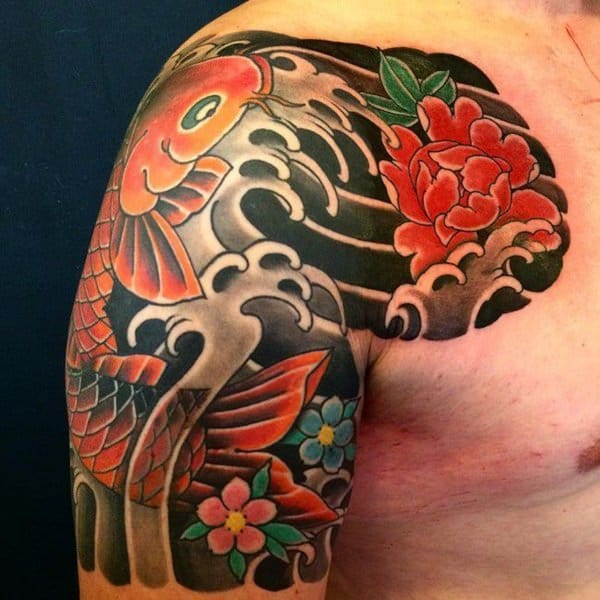
Another important aspect of a Koi fish tattoo is the direction in which it swims. A Koi fish swimming upstream is believed to be a representation of perseverance through challenges and obstacles. It is a reminder that no matter how difficult the journey may seem, one must keep pushing forward. On the other hand, a Koi fish swimming downstream is believed to be a symbol of good luck, as it represents an easy and smooth journey.
In conclusion, Koi fish tattoos are one of the most popular tattoo designs in Japanese tattoo art. They represent strength, determination, perseverance, transformation, and change, making them an excellent choice for anyone seeking to embody these qualities. The color and direction of the Koi fish in the tattoo further enhance its symbolism, making it a meaningful and personal choice for each individual.
Dragon
Tattoos are a form of self-expression that have been prevalent in many cultures throughout the world for centuries. In Japan, tattoos have a rich history and hold significant cultural and symbolic meaning. One of the most popular designs in Japanese tattoo art is the dragon.
Dragons have deep roots in Japanese mythology and are considered one of the most powerful and revered creatures in Japanese culture. They are often depicted in Japanese tattoo designs as majestic, serpentine creatures with scales, sharp claws, and piercing eyes. The symbolism behind the dragon tattoo is multifaceted, as it represents power, strength, and wisdom.
In Japanese culture, dragons are believed to control the elements of nature such as rain, storms, and earthquakes. They are also associated with water, which is why you’ll often find them depicted near rivers, oceans, or other bodies of water. It is believed that the dragon’s control over the elements protects people from harm and brings good fortune.
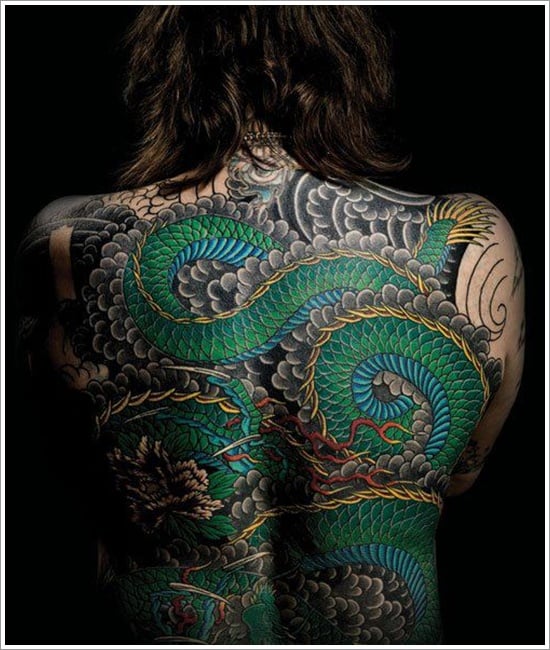
The image of a dragon in Japanese tattoo design can be interpreted in several ways depending on the specific style and composition of the tattoo. For example, a tattoo featuring a dragon with its mouth open and flames coming out symbolizes power, aggression, and dominance. On the other hand, a dragon with its mouth closed represents restraint, patience, and control.
In addition to its association with nature and the elements, the dragon tattoo also carries deep-rooted spiritual and cultural significance in Japanese mythology. Dragons are often seen as guardians and protectors, and wearing a dragon tattoo is believed to offer protection and guidance to the wearer.
Overall, the dragon tattoo is a staple in Japanese tattoo art and holds a special place in Japanese culture. Its symbolism of power, strength, wisdom, and protection has been deeply ingrained in Japanese mythology and continues to inspire modern-day tattoo enthusiasts around the world.
Cherry Blossoms
Tattoos have been a significant part of human culture for centuries, and they hold different meanings for different people. In Japanese culture, tattoos are not only a form of self-expression but also a way to connect with their rich cultural heritage. Among the many symbols that are used in Japanese tattoo designs, cherry blossoms stand out as one of the most popular and meaningful ones.
In Japan, cherry blossoms, also known as Sakura, are a national symbol that holds deep cultural significance. For centuries, they have been revered for their beauty, grace, and delicate nature. Cherry blossoms bloom for only a short period of time each year, usually in spring, before falling off the branches and scattering onto the ground. This fleeting nature of their existence has made them a powerful symbol of the transience of life.
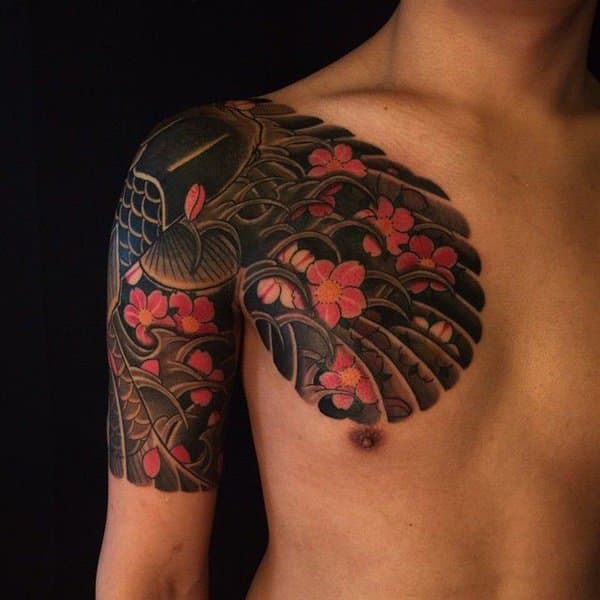
In Japanese culture, the concept of impermanence is central to their philosophy and is believed to be a fundamental truth of existence. The idea behind this is that everything is constantly changing, and nothing lasts forever. This belief is reflected in many aspects of Japanese culture, including art, literature, and religion.
Cherry blossoms are often used in Japanese tattoo designs to depict the transience of life and the beauty that comes with it. They are usually depicted in full bloom, with their delicate petals and vibrant colors. This imagery is meant to convey a sense of fleetingness, reminding the wearer to cherish every moment and appreciate the beauty in life while it lasts.
While cherry blossom tattoos are often associated with feminine grace and beauty, they can also hold deeper meanings for those who wear them. Some people choose to get cherry blossom tattoos as a tribute to loved ones who have passed away, as a way to honor their memory and celebrate their life. Others may choose to get cherry blossom tattoos to remind themselves of the impermanence of life and to live in the present moment.
In conclusion, cherry blossom tattoos are a powerful symbol of Japanese culture and hold deep meaning for those who choose to wear them. They represent the transience of life, the beauty that comes with it, and the importance of cherishing every moment. Whether you choose to get a cherry blossom tattoo for its aesthetic beauty or its deeper symbolic meaning, it is sure to be a meaningful and significant addition to your body art.
Samurai
Tattoos have been used as a form of expression and art for centuries. In Japan, tattoos have a long history dating back to the ancient times where they were used to symbolize various cultural and social beliefs. One of the most prominent tattoo designs in Japanese culture is the samurai tattoo.
Samurai were legendary warriors in ancient Japan, known for their remarkable fighting skills, discipline, honor, and courage. These warriors were highly respected in Japanese society, and their code of conduct was a source of inspiration for many people. The samurai tattoo is a symbol of these qualities and serves as an emblem of strength, loyalty, and the warrior spirit.
The design of a samurai tattoo can vary depending on the wearer’s preference and the artist’s creativity. However, some common elements are often included. For instance, the image of a samurai warrior wearing armor and wielding a sword is a classic depiction of the tattoo. The tattoo may also include other symbols such as cherry blossoms, dragons, or koi fish to enhance its meaning.
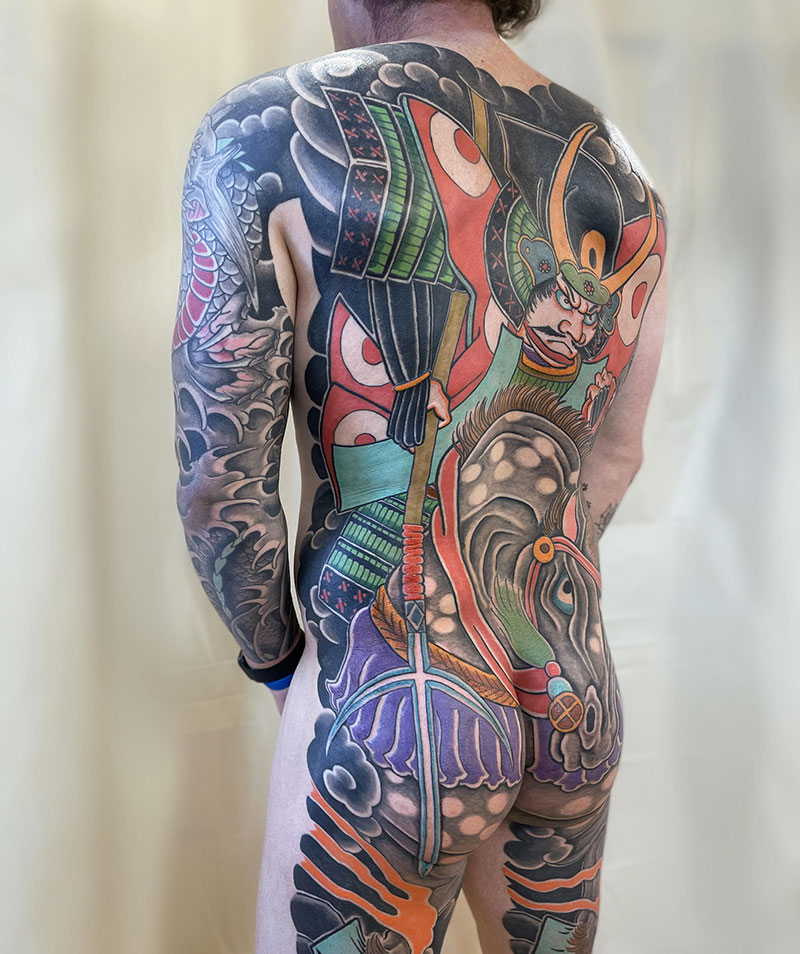
The samurai tattoo holds significant cultural and historical importance in Japanese society. It represents the values and ideals that the samurai held, which continue to inspire people today. It is believed that by wearing a samurai tattoo, one can embody the essence of these virtues and become a better person.
Apart from its cultural significance, the samurai tattoo also has personal meaning for many individuals who choose to get it inked on their bodies. For some, the tattoo is a reminder of their own strength, resilience, and determination, while for others, it represents their connection to their Japanese heritage or love for the country’s rich history.
In conclusion, the samurai tattoo is a powerful symbol of strength, loyalty, and the warrior spirit. It holds deep cultural and historical significance in Japanese society and continues to inspire people around the world. Whether you choose to get a samurai tattoo for its cultural or personal meaning, it is undoubtedly a timeless and meaningful design that will leave a lasting impression.
Geisha
Tattoos have been a popular form of body art for centuries, serving as symbols of personal beliefs, values, and emotions. One such design that has gained popularity in recent years is the geisha tattoo, which is inspired by Japanese culture and tradition.
In Japanese culture, geishas are highly skilled female entertainers who are trained in various arts, including music, dance, and conversation. They are admired for their beauty, gracefulness, and refined skills, and they often serve as a symbol of traditional Japanese femininity.
Geisha tattoos are popular among both men and women and are typically designed to capture the beauty and elegance associated with these traditional entertainers. The design usually features a geisha dressed in traditional attire, with intricate patterns and detailed designs that reflect the cultural significance of this iconic figure.
One of the key meanings of a geisha tattoo is femininity. Geishas are often seen as the embodiment of traditional Japanese femininity, representing grace, poise, and elegance. As such, a geisha tattoo can serve as a powerful symbol of feminine energy and beauty.

Another significant meaning of a geisha tattoo is sophistication. Geishas are known for their refined skills and impeccable manners, and they are often viewed as role models for young women seeking to cultivate a sense of refinement and elegance in their own lives. A geisha tattoo can therefore serve as a reminder of the importance of cultivating sophistication and grace in one’s own life.
Finally, a geisha tattoo can also represent a connection to Japanese culture and tradition. For many people, particularly those with Japanese heritage, a geisha tattoo serves as a powerful reminder of their cultural roots and the traditions that have shaped their identity.
In conclusion, a geisha tattoo is a beautiful and meaningful way to pay homage to one of Japan’s most iconic cultural figures. Whether you want to celebrate your own femininity and grace or connect with your Japanese heritage, a geisha tattoo can serve as a powerful symbol of beauty, sophistication, and tradition.
How to Use Tattoo Meaning Japanese
If you are considering getting a Japanese tattoo design, it’s essential to understand the symbolism behind each element of the design. You should also choose a reputable tattoo artist with experience in Japanese tattoo design. Before getting inked, take the time to research various designs and their meanings. You can also consult with your tattoo artist to help you create a custom design that reflects your personality and beliefs.
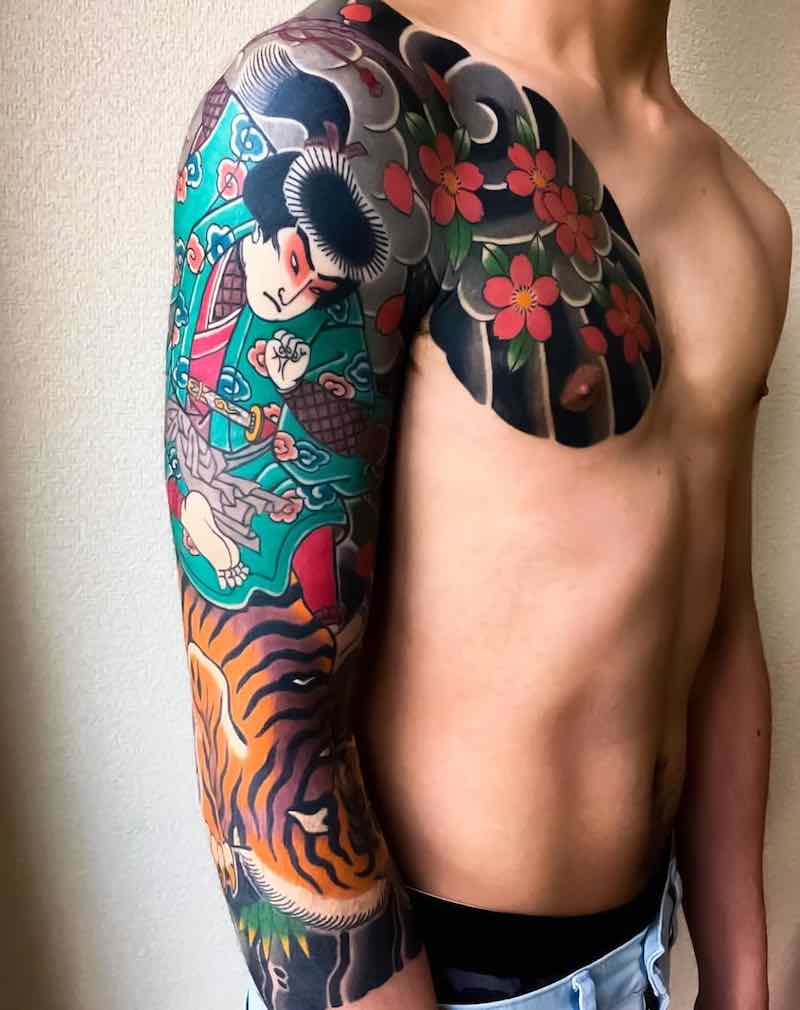
Examples of Tattoo Meaning Japanese
There are countless examples of Japanese tattoo designs, each with its unique symbolism and meaning. Some popular examples include:
- A koi fish swimming upstream, representing determination and transformation.
- A dragon wrapped around a cherry blossom tree, symbolizing power and the transience of life.
- A samurai warrior with a sword, representing honor, courage, and strength.
Comparisons of Tattoo Meaning Japanese
Japanese tattoo designs are distinct from other styles such as American traditional or tribal tattoos. Unlike these styles, Japanese tattoos are highly detailed and often tell a story through multiple elements. Additionally, Japanese tattoos tend to use brighter colors and have more intricate linework. While other tattoo styles may focus on simplicity and boldness, Japanese tattoos are all about the details.
Advices for Tattoo Meaning Japanese
If you’re considering a Japanese tattoo design, here are some tips to keep in mind:
- Do your research: Take the time to understand the symbolism behind each element of the design.
- Choose a reputable tattoo artist: Look for an artist with experience in Japanese tattoo design and a portfolio that reflects your style.
- Be patient: Japanese tattoos often require multiple sessions to complete due to their intricate designs.
- Prepare for the pain: Japanese tattoos can be painful, especially in areas with thin skin or bone.
- Care for your tattoo: Follow your tattoo artist’s aftercare instructions to ensure proper healing and longevity of your tattoo.
Conclusion
Japanese tattoo designs are rich in symbolism and history and have become increasingly popular in recent years. From koi fish to dragons to cherry blossoms, each element of a Japanese tattoo has a specific meaning and tells a story. If you’re considering a Japanese tattoo design, take the time to research various symbols and their meanings, choose a reputable tattoo artist, and be prepared for the pain and healing process. A Japanese tattoo can be a beautiful and meaningful expression of your personality, beliefs, and identity.

I am Harvey Berry, a tattoo enthusiast who has immersed himself in the diverse world of ink, passionately exploring the beauty and artistry within each tattoo. My mission extends beyond uncovering the aesthetics of tattooing; it involves sharing in-depth knowledge across all aspects of this art form.
Fueled by genuine curiosity and love for every facet of tattooing, I have diligently crafted well-researched articles, with a special focus on the Tattoo Meaning of Impeccable Nest section. Here, my aim is to help the tattoo community gain a deeper understanding of the meanings and values embedded in each tattoo.
One of my primary goals is to encourage responsible decision-making when it comes to getting inked. I recognize that choosing to get a tattoo is a significant personal decision that requires careful consideration. Hence, I provide diverse resources covering the meaning of tattoos, the tattooing process, aftercare tips, and other valuable information.
Whether you are a seasoned tattoo enthusiast or embarking on your first exploration of the world of body art, I aspire to be a reliable resource for you at every step of your journey. I hope that my extensive knowledge of tattoos, especially in the Tattoo Meaning section, will assist you in finding inspiration to express yourself through the art of tattoos.
